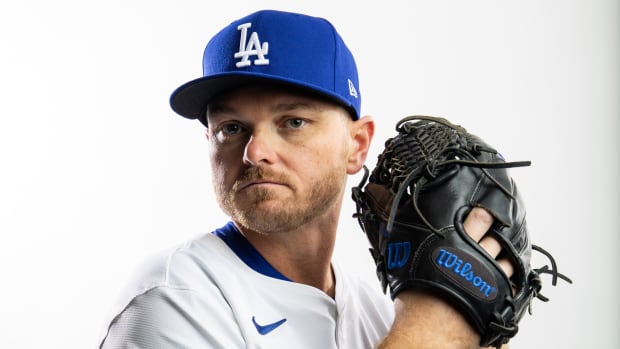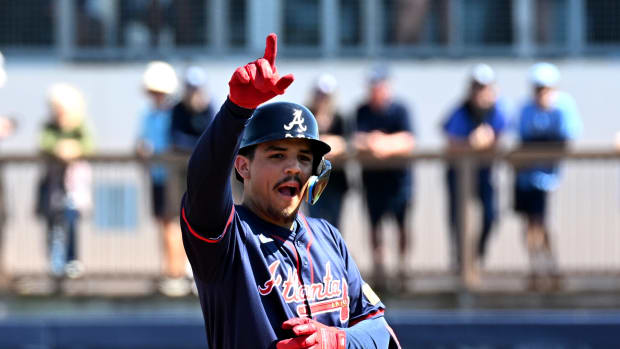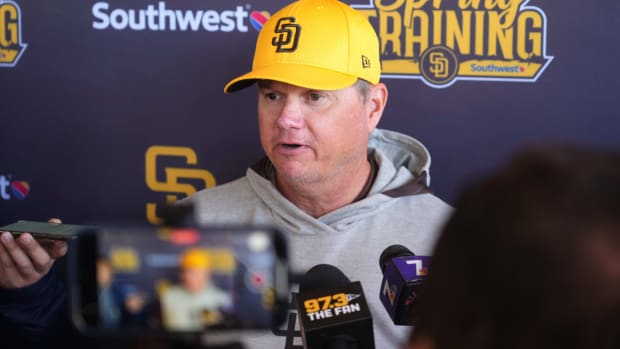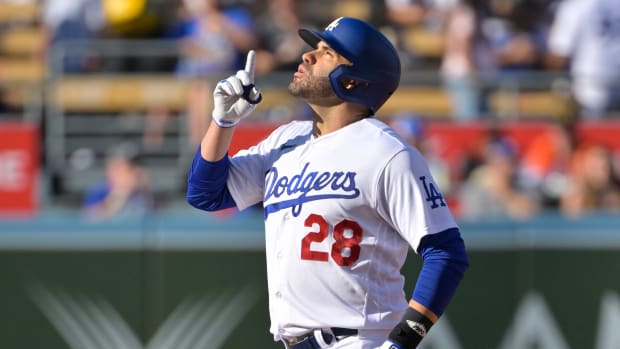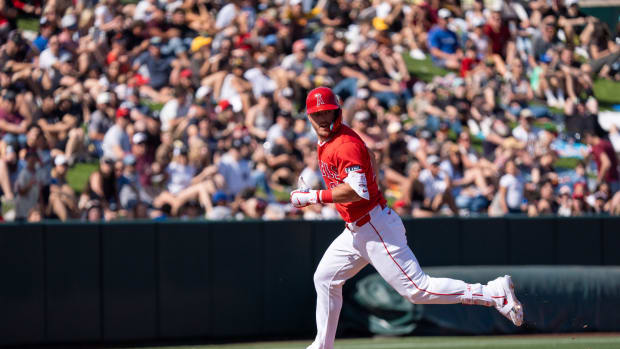Cubs making history and earning believers with red-hot start
Get all of Charles P. Pierce’s columns as soon as they’re published. Download the new Sports Illustrated app (iOS or Android) and personalize your experience by following your favorite teams and SI writers.
CHICAGO—There is West Addison Street and there is Clark Street and there is Waveland Avenue. Somewhere within the grid that they circumscribe is the happiest place on Earth right now. It might be the old ballpark with the new scoreboard, but that might be too limited a space for the happiest place in the world. It spreads itself around the gentrified brick apartments and into the vast darkness of a dozen bars, and off down the street toward the big lake.
You can’t beat the Chicago Cubs now. You can't even hope to contain them. You can put them in pink shoes, in honor of Mother's Day. They’ll beat you. You can make them swing that big pink lumber. They’ll beat you. You can make them work through four hours plus on a glorious Sunday afternoon, make them work until they send up Javier Baez to hit in the 13th inning, because he was all they had left for a catcher, and Baez hadn’t caught since he was in 10th grade. That didn’t matter. Baez stood in against Blake Treinen of the Washington Nationals, stood in there with his pink shoes and waving that big pink lumber, and he dropped a 2–2 slider into the leftfield seats. The Cubs had swept the Nationals, winning the extended finale of a four-game series, 4–3. Before that, they had swept the Pirates in Pittsburgh. They were now 24–6 on the year, the best start by any major league team since the 1984 Tigers, and that little square piece of history was the happiest place on earth.
After the game, Baez was asked if he planned on using the pink bat after Mother’s Day was over.
“I think,” he said, “I’m just going to give it to my Mom.”
Let us be honest. As a longtime Chicagoan friend of mine put it, a Chicago Cubs World Series championship is the Last Great American Sports Story. The Red Sox have had their moment; in fact, they’ve had three of them. The ongoing futility that is the city of Cleveland is an interesting historical glitch—and LeBron James may yet correct it this year—but there are still people alive and prospering who remember Jim Brown and 1964. There have been Triple Crown winners, one as recently as last June. The Cubs are what’s left. The last time they got off to a start this hot was in 1907. They won the World Series that year, and they won it the next year, too. That was back when uniforms were flannel and when the Republicans nominated people like William Howard Taft and Teddy Roosevelt. The next Cubs World Series win will be the Last Great American Sports Story.
The 30: Starting pitchers in focus for Week 5 MLB power rankings
Cubs fans have always had a different kind of relationship to their endless frustration than did, say, Red Sox fans. Steve Bartman may disagree, but Chicago's was generally a kind of carefree and nonchalant disappointment. They don’t engage their doomstruck history the way Boston fans used to—with monetized mourning and weaponized self-regard. Through 1969, and Bartman and that awful collapse against the Marlins in the 2003 NLCS, nothing has happened to the Cubs that a dog and a cold beer couldn’t fix. So now that the Cubs are on the best run they’ve had since before World War I, their fans don’t hang yesterday’s crepe on today’s happiness. There is a lightness about the ballpark that has filtered down into the clubhouse.
“A lot of stuff seems to be going our way,” said Kris Bryant, Chicago’s 24-year-old third baseman. “We feel like we can win every game. It’s anybody or any time. It gives us such a peace of mind. I can’t remember any team like this, where it’s somebody different every day—even back to T-Ball, Little League. I’ve never seen anything like this.”
Over the weekend, the Cubs won both games on pure cussedness. On Saturday, they trailed, 4–2, in the sixth inning when they staved off more damage with an ATM code double play—2-5-4-2-5—and then took the lead for good in the seventh when shortstop Addison Russell dumped a fly ball down the rightfield line on which Bryce Harper declined to leave a Bryce Harper-shaped hole in the wall. It fell for a two-run double.
Cubs’ strategy of pitching around Bryce Harper pays off in sweep
On Sunday, ace Jake Arrieta struggled, at least by his own standards. He threw 100 pitches over five innings, gave up six hits and two earned runs, ballooning his ERA to 1.13. He left with Chicago trailing 3–1. Nevertheless, the Cubs came from behind again as Joe Maddon went through his entire lineup, his entire bullpen and his entire manager’s syllabus, including walking Harper six times. (In his other plate appearance, Harper was hit by a pitch.) “Our guys were in that game until the last drop,” Maddon said. “Game like that, a long game, guys could just mail it in. They just come ready to play. And I know that sounds corny and so simplistic.”
(We will leave for another day a discussion of why Washington manager Dusty Baker—Welcome back to Wrigley, big guy!—kept light-hitting Ryan Zimmerman batting behind Harper instead of protecting his star with Daniel Murphy, who is hitting a mere .402 at the moment. Harper walked 13 times during the four games here. Long about, oh, I don’t know, maybe the eighth walk, shouldn’t you catch on that something odd is afoot? On the upside, Harper’s OBP went to the moon.)
As he proved in Tampa and as he’s proving now in Chicago, there is nothing about Maddon that is a cliché, even when he’s forced to resort to one of them to explain what’s going on around him. He is a blessed eccentric in a sport that discourages them. To celebrate Cinco de Mayo last week, Maddon arranged to have a mariachi band come strolling through the Cubs' clubhouse. And, in a profession noteworthy for the number of old men yelling at clouds, Maddon decided years ago that he wasn’t going to tie himself down with the knucklehead stuff.
“I’m over 50, but I can identify with who they are and what they’re doing,” Maddon said. “I do all I can to remain contemporary because, if you remain contemporary, you remain employable. I may not like the music, but I like some of it. Methods of dress? I’m good with it.”
#http://www.120sports.com/video/v177028394/cubs-best-nats-in-13-innings
Maddon was the cornerstone of a rebuilding plan that team president Theo Epstein put in place when he arrived in Chicago five years ago from Boston, where two teams of his construction had laid all the ghosts of that franchise to rest. Upon his arrival at the Cubs training facility in Arizona that year, Epstein took his entire front office on retreat to begin to create a new culture around the franchise. “We had our eye on being pretty good in 2016,” Epstein said. “I think last year was a little ahead of schedule. We brought in a lot of young guys and expected to be competitive by the end of the year.”
Instead, charged by young talent, the Cubs erupted in August and September, finishing with 97 wins and then beating the Pirates in the National League wild-card game and the Cardinals in the Division Series before losing to the Mets in the NLCS. “Instead of regressing, our young guys got better during the year," said Epstein. "That surprised us. We figured three rebuilding years, and then the transitional year in ’15, and then be really good in 2016 for a while now.”
• Subscribe to get the best of Sports Illustrated delivered right to your inbox
So far in his career running baseball teams, Epstein has worked for franchises that are a combined 216 years old. So, maybe, he might like a crack at running an expansion team some day instead of specializing in old franchises with spectacular histories of garish failure. “It adds a lot of meaning to work in a place where you know a lot of people care, and you can make a lot of people happy,” Epstein said. “I will say, though, when we got here, there was not a lot of talent, so it felt as bottom-up as an expansion team would have. When we got here, we felt like we had one impact player.”
Nonetheless, if this team of Epstein’s devising manages to win this franchise’s first world championship in over a century, having already ended eight decades of disaster in Boston, Epstein will own a baseball CV like very few other executives in the history of the game. “I don’t think about it in that way,” he said. “I think of what it will mean to the Cubs organization and what it will mean to Cubs fans. You feel like when you start thinking about yourself and your role, and certainly when you start thinking about your legacy, bad things happen. That’s not what you do when you’re in the middle of grinding and trying to make good things happen.”
There is sun on that history now, no matter how much all of that history wants to make Epstein and his fans avert their eyes from what’s happening right in front of them in dread of what might happen later this season. The Cubs, who have done so much that has been ridiculous since William Howard Taft went a’waddling through corridors of power, are now winning at a ridiculous pace. It is hard not to laugh, which is another thing that nobody ever has forgotten how to do in that little square space not far from the big lake which is, for now, the happiest place on earth.






























